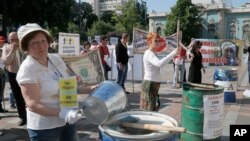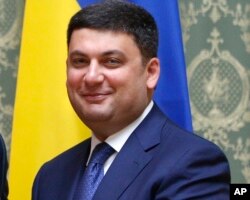Ukraine feels its reform efforts have been vindicated by the International Monetary Fund's decision to give it another $1 billion in aid, but the country still faces a struggle to speed economic growth and achieve lasting change.
After waiting for nearly a year for Kyiv to accelerate reforms, the IMF announced the release of more aid Wednesday. It's part of a $17.5 billion bailout aimed at shoring up an economy brought low by a pro-Russian separatist war in the east.
The money will go to increasing Ukraine's foreign exchange reserves, which in turn should help stabilize the hryvnia currency and give the central bank space to further loosen restrictions on foreign exchange trade.
Spreads on sovereign bonds should narrow in the coming weeks, said Olena Bilan, chief economist at Dragon Capital.
The latest cash injection comes as Ukraine's economy has been looking stronger and Western powers have talked up the prospects of bringing lasting peace in the Donbass region, where fighting has killed more than 9,600 in two years.
After shrinking by nearly a tenth last year, the economy is expected to grow by 1 percent in 2016. Inflation should reach single digits next year, from 43.3 percent last year.
But it's not known whether Ukraine's leaders can bring the kind of transformation they promised voters after the 2014 Maidan street protests brought a Western-backed government to power.
Struggles persist
Moreover, it remains to be seen whether the Ukrainian government, with a shaky hold on parliament and a patchy record on tackling corruption, will do enough to secure more IMF money by the end of the year.
Central Bank Governor Valeriia Gontareva thinks it can, saying Thursday that Ukraine should receive another $1.3 billion from the IMF this year.
But Prime Minister Volodymyr Groysman may struggle, for example, to get unpalatable pension reforms requested by the IMF through parliament, which include ending early retirement privileges for teachers and doctors.
The opposition party led by fiery former Premier Yulia Tymoshenko has vowed to strike down a reform to bring gas prices up to market rates.
There are also lingering doubts about Ukraine's willingness to tackle entrenched corruption, which remains the biggest single worry for investors, according to a report released this week by the European Business Association.
Businesses still complain of unfair treatment at the hands of state institutions, such as the tax authorities or prosecutors looking to squeeze out bribes. Several instances this year suggested Kiev's leaders were backsliding on their commitments to stamp out graft, including attempts to delay the launch of an electronic system obliging officials to declare their wealth.
"It will be possible to judge the outlook for Ukraine's further cooperation with the IMF on the headway made in talks on the 2017 draft budget, the ability of parliament to adopt unpopular reform laws, and the progress or lack thereof in the fight against corruption," Bilan said.
Pensions swallow up a fifth of the budget, but reducing that burden could be a tall order for the ruling coalition, which relies on outside support to keep a majority in parliament.
"The likelihood of getting another tranche before the end of the year is low, because it's doubtful laws will be adopted quickly by parliament in order to carry out the next [IMF] requirements," said Alexander Valchyshen, head of research at Investment Capital Ukraine.
No 'visible change'
Ukraine initially expected the latest tranche last October, but the IMF repeatedly delayed it while a political crisis — which eventually brought down the last government — put the brakes on reform.
The latest tranche is smaller than the $1.7 billion that Kyiv had originally expected, which Ukrainian officials attributed to the government's sluggish reform efforts. The IMF called it a "rephasing" of the bailout program to align it with required policy changes.
Some policy steps have barely got off the ground. The IMF has urged Ukraine to privatize state enterprises, but the first company to be put on the block, a fertilizer producer in Odessa, attracted no bids at an auction in July.
Moreover, a study released by the EBA on Wednesday showed the extent to which Ukraine has to go to tackle corruption.
"Despite the authorities' attempts to improve the situation by introducing an anti-corruption agency or, for example, a new system of public procurement, business has experienced no drastic and visible change," said Anna Derevyanko, EBA executive director.
Similarly Ukraine's business ombudsman received 213 complaints from businesses about their treatment at the hands of state bodies in the second quarter of this year, the second highest rate since the body was set up in 2014.
"There are a lot of unhappy companies with the results of tax audits," Oleh Krykavskyy, an investigator at the ombudsman's office, told Reuters.
That is the kind of thing that needs to change if Ukraine wants to get on a higher growth trajectory, said Oleksandr Zholud, senior analyst at the International Center for Policy Studies.
"You can say that we're on a trajectory of economic growth, but the pace is very slow," Zholud said. "At this rate we'll only get back to the level of 2013 in 2020-21. Ukraine needs a quicker pace, and for this, reforms need to be carried out more actively and the authorities [need to be] cleaned up."






